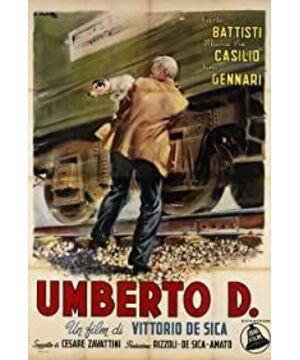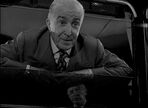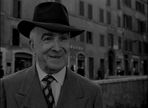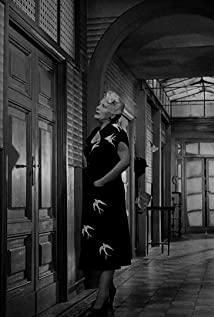The film focuses on the survival plight of the retired government employee, Humberto D, and faithfully records his unremitting efforts to maintain his life. It fully demonstrates his way of striving for disappointment, despair, and finally hope from despair. course. The film focuses on the lives of ordinary people in real life, and the selection of materials focuses on the living conditions of the elderly. The deep exploration of the problems of the elderly and the director's compassionate feelings are the highlights of the film.
The film has two narrative clues, the main line is Umberto, and the secondary line is Maria, the kitchen maid who sympathizes with Umberto.
The temperature do Alto road for the
order to repay the debt, continue to fight for the rental has been rented room temperature and do not have no choice Alto, reluctantly sold his watch, his beloved books, but in exchange for a few Thousand lire is just a drop in the bucket. He also asked his friends for help, but was turned down. He didn't give up his efforts until the wall of his room was broken through.
Umberto's road to fight was twists and turns. At first, he sold his belongings. Later, he caught cold and became ill. He entered the mission hospital for treatment and avoided debts. After he was discharged from the hospital, he found that his room would be opened. Frank was let go by the landlady and disappeared. Umberto's search for Frank's paragraph film has a fast pace, the background music is also rushing and powerful, and the contradictory development of the film has reached a small climax. Frank is Umberto's favorite partner and only support. Fortunately, he found Frank, and he finally ignited hope for life. He asked his friend for help but was rejected. Helpless, he even thought of begging, but his pride forced him to retract his outstretched hand. In the end he found his room in a mess, and he was powerless and angry. He simply packed his clothes and lost everything. He made the last effort, not for himself, but for Frank. He didn't want Frank to die with him, so he decided to entrust Frank to someone else. However, his attempts to foster and send people off failed. In desperation, he picked up Frank and walked to the railroad tracks. While he was hesitating, Frank chose to survive firmly. Umberto was also encouraged, and he started playing carefree with Frank again...
One Man's Fight The
whole film begins with the fight for Umberto, who has been fighting for him to maintain the status quo in his life. But the process of fighting is also a process of constant rejection. Constantly rejected, he found that no power could be relied upon. He sought an increase in his pension from the government, but the deportation of the police ended the demonstration; he placed his hopes on social relief, but the symptoms did not cure the root cause; he tried to borrow money from his friends, but his friends refused. It’s worth mentioning that I think he also did not return hope to the landlady. When Umberto was chatting with people in the relief hospital, he recalled that he and the landlady once had a very harmonious relationship. "I gave her meat during the war." He treated her like a daughter, but now the landlady is ruthlessly This helpless old man must be driven away. This also confirms that children cannot be relied upon. In the face of money, there is no emotion. Frank and Maria, friends around Umberto, were unable to help him. Therefore, he was always alone in "fighting", trying his best to gain a little living space for himself.
Unable to face life
Umberto’s struggle is firm and decisive. He has the moral integrity, principles and self-esteem as an intellectual. He always dresses neatly, can't insist on staying in a nursing home, etc., which are all manifestations of his self-esteem. Some people may wonder why he stayed in this house so desperately? He can find a house with a lower rent, but I think his persistence in the status quo is due to his self-esteem as an intellectual. He was angry with himself and declared war on the world. I have worked for the government all my life. In the end, can I not even maintain the status quo? He sold his belongings desperately, but the war was doomed to failure. He can no longer change reality while maintaining his self-esteem. He cannot decide his own destiny. His destiny is determined by the times. Together with the different survival plights of many people in the lower class of society at that time, they constitute the tragedy of the times. His last departure was also a farewell to his previous life, he lost his belongings. Therefore, his departure also has an unspeakable tragic power.
Lonely sunset
The brilliance of the film is that it not only shows the social problems of the time, it also shows another theme of the problem of the elderly—the psychological problems of the elderly—this problem is an important proposition in sociology that transcends the boundaries of time and space.
In addition to financial constraints, Umberto also suffers from spiritual loneliness. The old people of his age should now be full of children and grandchildren, sharing the moment of family relationship, but he lives alone without children. No one cares about the mental condition of the elderly, even the maid Maria who cares and sympathizes with the elderly and takes care of Umbertoto. She would fetch him water during his illness and help him take care of Frank, but she still can’t understand the anger and sadness that Umberto was when he learned that the puppy was missing, because she didn’t understand the importance of Frank to Umberto. ——Family, friends, unforgettable partners. The landlady even pushed him out of the house in spite of his embarrassment and helplessness. The old man's best friend Frank, although he was with him when he was lonely and brought him hope of life, he still couldn't fully share the worries and alleviate the pain for the old man. The old man had nowhere to complain, which also led to his desperate choice to die when he was desperate. Another clue to the
petty townspeople’s cute
movie is the maid Maria. At the beginning of the movie, we learned that she was pregnant, but we didn't know who the father of the child was, and it was difficult to decide between the two men. She once said that the landlady would fire her once she knew she was pregnant. Her fate is unknown, and her life hangs in the balance.
She is a kind girl who gives great help and care to the helpless old man Umberto. She helped Umberto, who was in a disadvantaged group, as much as she could. However, she herself belonged to a disadvantaged group and received no more help. The director gave this girl great sympathy, and the audience did not criticize and condemn her because of her entanglement between the two men and the unmarried pregnancy. On the contrary, the audience was worried about her future and destiny. However, like Umberto, her destiny belongs to the era and is determined by the era.
What's interesting is that the director in the film has a completely different view of the critics in the public morals and ethics, and he shows the loveliness of those people. With the exception of Maria, the kitchen maid, a typical example is the patient of Umberto in the Mission Hospital. This approach should not be certain, but under the director's lens, we see the image of an enthusiastic but enthusiastic citizen. Under the tremendous pressure of life, the people at the bottom are opportunistic for survival, but it reflects the real moral deficiencies of the high-income groups.
With a sigh,
this is a film made by the director with great compassion. The Italian cities in the lens are dark and life in the lens is difficult, but the beauty that passes by in a flash confirms our reason and hope for living. Regarding the living conditions of Umberto and other lower-class citizens in the film, the director just left a heavy sigh. There are criticisms of the imperfect social system and complaints about the dreary state of affairs. Because the director intends to commemorate-to record the living conditions of the next generation of elderly people with images, and at the same time to give the audience hope, the director set an open ending. The old man in the distance and the carefree and playful figure of Frank seem to be a bright tail, but the image of Umberto has long been deeply embedded in the hearts of the audience and has become a memory of an era-every country will also be there. In depression, there are many dear and lovely old fathers running around.
View more about Umberto D. reviews











